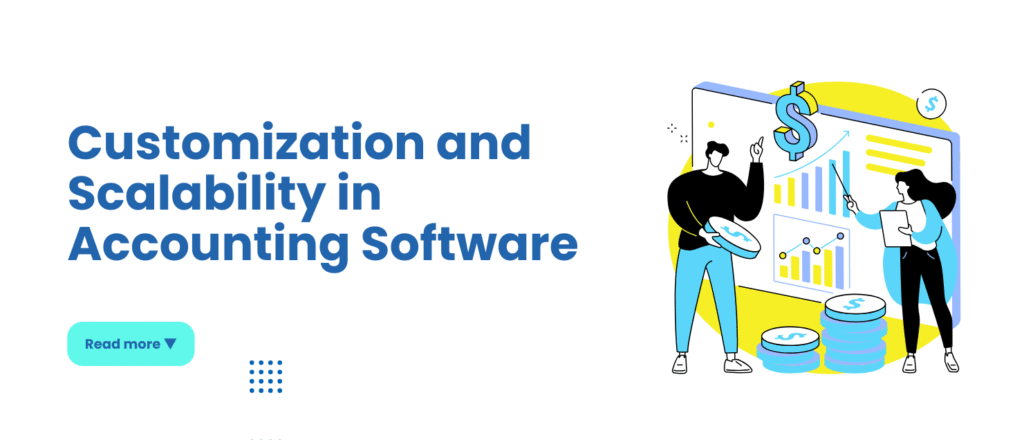
In today’s dynamic business landscape, the need for robust and adaptable accounting software has never been more critical. Businesses, regardless of their size or industry, require solutions that not only cater to their current needs but also evolve with them. This is where customization and scalability in accounting software come into play. Let’s delve into why these features are essential and how they empower businesses for sustainable growth.
Table of Contents
The Need for Customization
Every business is unique, with specific processes, requirements, and goals. Off-the-shelf accounting solutions may offer a broad range of features, but they often fall short in addressing the nuanced needs of individual businesses. Customization bridges this gap by allowing companies to tailor the software to their unique workflows and preferences.
- Enhanced Efficiency: Customized accounting software can streamline operations by automating specific tasks that are unique to the business. This reduces manual effort and the risk of errors, leading to increased efficiency.
- Improved User Experience: Tailored interfaces and functionalities ensure that the software aligns perfectly with the user’s needs, making it more intuitive and easier to navigate.
- Better Reporting and Analytics: Customizable reporting tools enable businesses to generate detailed reports that provide meaningful insights. These can be tailored to highlight key performance indicators specific to the business.
- Integration with Other Systems: Businesses often use multiple software systems. Customized accounting solutions can integrate seamlessly with existing systems, ensuring smooth data flow and reducing the need for duplicate entries.
The Power of Scalability
As businesses grow, their accounting needs become more complex. Scalable accounting software ensures that the system can handle increasing volumes of transactions and data without compromising performance.
- Handling Increased Data: Scalable solutions can manage a growing volume of transactions, clients, and financial records efficiently. This is crucial for businesses experiencing rapid growth.
- Supporting New Business Models: As companies expand, they may diversify their offerings or enter new markets. Scalable accounting software can adapt to these changes, supporting new currencies, tax laws, and reporting standards.
- Cost-Effectiveness: Scalable software often operates on a subscription basis, allowing businesses to pay for what they need. As the business grows, they can upgrade their plans to access more advanced features, making it a cost-effective solution.
- Future-Proofing: Investing in scalable software ensures that businesses are prepared for future growth. This eliminates the need for frequent software changes, which can be costly and disruptive.
Real-World Examples
- Small Business Growth: A small e-commerce startup initially used a basic accounting solution. As their sales volume grew, they customized their software to include automated inventory management and integrated payment processing. This allowed them to handle increased orders efficiently and scale their operations.
- Enterprise-Level Expansion: A mid-sized manufacturing firm scaled its accounting software to accommodate international operations. The scalable solution supported multiple currencies and integrated with their existing ERP system, facilitating smooth global operations and compliance with diverse regulatory requirements.
Choosing the Right Software
When selecting accounting software, businesses should consider their current needs and future growth plans. Key factors to evaluate include:
- Customization Options: Ensure the software allows for significant customization to meet specific business requirements. Look for features that can be tailored to your unique workflows and reporting needs.
- Scalability: Assess the software’s ability to grow with your business. Check if it can handle increased transaction volumes, additional users, and new business models without compromising performance.
- Integration Capabilities: Choose software that integrates seamlessly with your existing systems, such as CRM, ERP, and payroll software, to ensure a unified and efficient workflow.
- User-Friendly Interface: A user-friendly interface is crucial for ensuring that your team can adapt to the software quickly and utilize its features effectively.
- Support and Training: Reliable customer support and comprehensive training resources can significantly enhance the implementation and ongoing use of the software.
Conclusion
Customization and scalability in accounting software are not just desirable features; they are essential components for businesses aiming for long-term success and growth. By investing in a solution that adapts to their unique needs and scales with their growth, businesses can achieve greater efficiency, improved decision-making, and enhanced financial management.
As the business environment continues to evolve, the ability to customize and scale accounting software will remain a critical factor in maintaining a competitive edge. Whether you’re a small startup or an expanding enterprise, choosing the right accounting software can empower you to navigate the complexities of growth with confidence and agility.